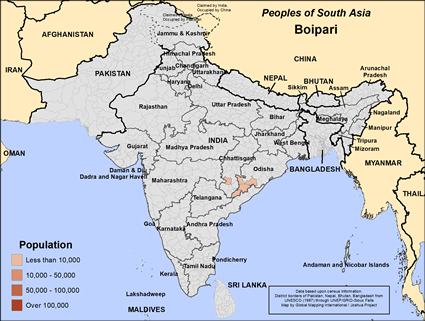The Boipari people have a long history in India, traditionally known for their roles as traders and merchants. They have traveled extensively across regions, contributing to local economies through trade. The Boipari speak regional languages such as Telugu, Tamil, and Kannada, reflecting their geographical diversity and cultural interactions.
Today, the Boipari people primarily live in rural and semi-urban areas, continuing their trading practices while also engaging in agriculture and small businesses. Many families grow crops like rice, pulses and vegetables to support their livelihoods. Their communities are close-knit, emphasizing strong family bonds and mutual support.
The Boipari people distinguish themselves from other groups through their extensive trading heritage and skills in commerce. Their adaptability and expertise in trade set them apart from neighboring communities.
Their wedding practices are elaborate and deeply rooted in Hindu tradition. Weddings typically include Hindu rituals such as the exchange of garlands, sacred fire ceremonies, and vibrant music and dance performances.
The Boipari's eating practices involve a diet primarily based on vegetarian food, including rice, lentils, vegetables and a variety of spices. They also enjoy traditional sweets and festive foods during celebrations.
The Boipari people practice Hinduism, worshiping various deities and observing numerous religious rituals and festivals such as Diwali, Pongal, and Navratri. Their belief system emphasizes values like dharma (duty), karma (actions and consequences), and ahimsa (non-violence). They also honor their ancestors through rituals and ceremonies, ensuring the transmission of their religious and cultural traditions across generations.
The Boipari people need better access to quality education to provide more opportunities for their children. Improved healthcare services are essential due to limited availability of medical facilities and high rates of preventable diseases. Economic support through modern agricultural techniques, market access, and vocational training can enhance their livelihoods. Infrastructure development, including better roads, clean water supplies, and reliable electricity, will greatly benefit the Boipari community. Addressing these needs will help the Boipari people achieve greater socio-economic stability while preserving their rich cultural and religious heritage.
Pray that God will send culturally-sensitive workers who will show them the way to the cross.
Pray for a Disciple Making Movement to flourish among this people group in the near future.
Pray for the Boipari people to be blessed with peace, joy and spiritual prosperity as they follow Jesus Christ.
Scripture Prayers for the Boipari in India.
Trading Communities of South India, Ministry of Commerce, Government of India, 2017.
Sharma, B.K., "Cultural Heritage of Andhra Pradesh and Tamil Nadu," Mittal Publications, 2011.
"Agricultural and Economic Development in India," Ministry of Agr
| Profile Source: Joshua Project |











